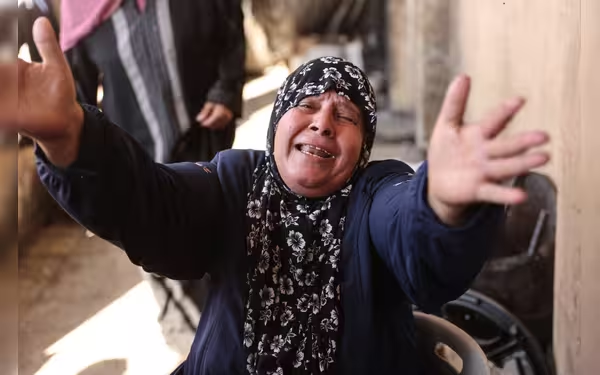Saturday, October 5, 2024 10:30 PM
Israeli Airstrikes Claim 12 Lives in Gaza, Ground Fighting Eases
- Israeli airstrikes kill 12, including journalist Wafa Al-Udaini.
- Ground fighting intensity decreases amid focus on Hezbollah.
- Over 41,500 Palestinians reported killed in ongoing conflict.
 Image Credits: arabnewspk
Image Credits: arabnewspkIsraeli airstrikes in Gaza kill 12, including journalist Wafa Al-Udaini, as ground fighting sees a slight decrease amid ongoing humanitarian crisis.
In recent weeks, the Gaza Strip has been the epicenter of a devastating conflict, marked by intense airstrikes and ground fighting. On Monday, Israeli airstrikes resulted in the tragic deaths of 12 individuals, including a journalist and her family, according to medical sources. This escalation comes amidst a backdrop of ongoing hostilities between Israel and Hamas, which began on October 7, when militants from Hamas launched an attack on southern Israel, leading to significant casualties and the capture of hostages.
The journalist, Wafa Al-Udaini, was known for her writings that advocated for the Palestinian perspective during the ongoing conflict. She lost her life when a missile struck her home in Deir Al-Balah, a central city in Gaza. Tragically, her husband and two children were also killed in the attack. This incident has raised the toll of Palestinian journalists killed since the onset of the conflict to 174, as reported by the Hamas-run media office in Gaza.
In addition to the airstrikes in Deir Al-Balah, other areas in Gaza also faced violence. In Rafah, near the Egyptian border, one Palestinian was killed, and several others were injured. An airstrike in Beit Hanoun, located in northern Gaza, resulted in the death of another individual and injuries to others. Furthermore, a strike on a house in Nuseirat, one of Gaza's historic refugee camps, claimed the lives of six people.
Despite the ongoing airstrikes, some residents have noted a slight decrease in ground fighting over the past week. This reduction in intensity appears to coincide with Israel's increased military focus on Hezbollah in Lebanon, particularly following the death of Hezbollah's leader, Sayyed Hassan Nasrallah, in an airstrike. The group confirmed Nasrallah's death, which has further complicated the already volatile situation in the region.
Hezbollah has been actively firing rockets into Israel for nearly a year, supporting Hamas in its struggle. Meanwhile, in a separate development, Israeli authorities released 12 Palestinians, including Khaled Al-Ser, the head of the surgery unit at Nasser Hospital in Khan Younis. However, those released have reported experiences of torture and mistreatment while in Israeli custody, allegations that Israel has denied.
The conflict has led to widespread displacement, with most of Gaza's 2.3 million residents forced to flee their homes. The toll of the violence has been staggering, with over 41,500 Palestinians reported killed, according to health authorities in Gaza. The humanitarian crisis continues to deepen, raising urgent questions about the future of the region and the prospects for peace.
As the situation evolves, it is crucial for the international community to pay attention to the human cost of this conflict. The loss of innocent lives, including those of journalists like Wafa Al-Udaini, underscores the urgent need for dialogue and resolution. The ongoing violence not only affects those directly involved but also has far-reaching implications for stability in the region and beyond. It is a stark reminder that behind every statistic, there are real people and families whose lives have been irrevocably changed by the horrors of war.













